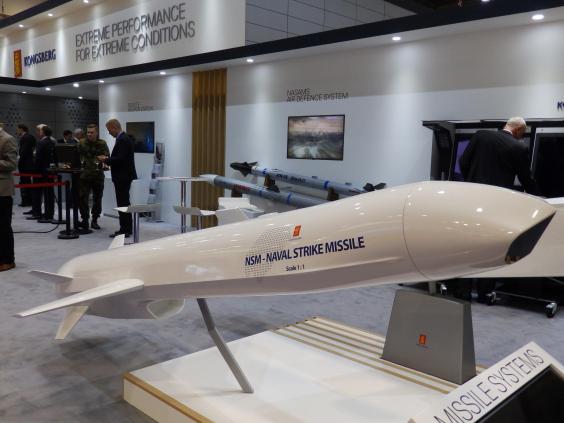New report estimates firms have made £600m profit during ongoing conflict
British arms companies have earned more than £6bn from their trade with Saudi Arabia during the ongoing war in Yemen, new research has found.
War Child UK claimed the true revenue from dealings with the Gulf state are almost double previous estimates, despite only around £30m going to the public through corporation tax receipts.
The charity accused private manufacturers including BAE Systems and Raytheon of “profiteering from the deaths of innocent children” by selling missiles and equipment to the Saudi-led coalition.
It stands accused of committing war crimes and killing thousands of civilians with its bombing campaign against Houthi rebels.
Rocco Blume, a conflict and humanitarian advisor at War Child, said Britain is not only selling arms to Saudi forces but maintaining them as well.
The estimated revenue from ongoing support pushed the estimated revenue far above the £3.6bn figure announced by the Campaign Against the Arms Trade last week.
“We all want to see productive international trade, but this is damaging,” Mr Blume told The Independent.
“The revenue has to be seen in the context of all the other costs incurred in this trade, especially to our international reputation, particularly on human rights.”
Mr Blume said there was a “lack of transparency” on the extent of British firms’ involvement amid a global weakening of protections for children in conflicts including Yemen, Syria and Iraq.
He also raised concern that the UK was becoming “less fussy” about international trading partners as Brexit approaches.
BAE Systems and Raytheon were among the exhibitors at an arms fair held in London last week, which was supported by Government ministers and senior military commanders.
Liam Fox, the International Trade Secretary,defended the “ethical” trade at the Defence and Security Equipment International (DSEI) event, telling delegates that Britain’s licensing system ensured exports are lawful and the UK does not violate international law.
The following day, the Sir Michael Fallon outlined his vision for the UK to take a bigger share of the international defence market after Brexit.
Mr Fallon said the UK secured defence orders totalling £5.9bn in 2016 and is already the world’s second-largest weapons exporter.
But War Child said there was a disparity between the economic benefit to the British public versus the profit for private firms inside the arms industry, which is estimated at almost £600m.
It found that an estimated tax revenue of 45 pence per head was “dwarfed” by pay and bonuses, as well as the amount spent by the Government on aid to Yemen.
A spokesperson said: “Weapons sales to Saudi Arabia generated just £13m in corporation tax in 2016, yet during 2017, the UK will spend £139m in humanitarian aid to Yemen.
“This means the Treasury is spending over four times in aid what it is getting back in tax.”
The Government has been forced to repeatedly defend the trade amid evidence of war crimes and civilian deaths in Yemen, where Saudi-led bombardment is worsening a hunger crisis and cholera epidemic.
Evidence found at the scene of massacres suggests some were carried out by British-made weapons, including Raytheon’s laser-guided Paveway IV smart bomb, which is manufactured in Fife.
In two years of civil war in Yemen, an estimated 1,300 children have been killed and 2,000 more injured, with 212 schools attacked and medical facilities destroyed and millions at risk of famine and cholera.
Yasser, 12, told War Child his mother, father and three siblings were killed in an air strike in northern Yemen.
“The first rocket fell on the hospital gate,” he said. “The sound was terrifying. I saw the bodies of people. Even my father was killed. I was afraid so I ran away to the mountains.”
Saudi Arabia was blacklisted by the United Nations for committing grave violations against children last year but later removed from the list after protests from the country’s government.
MPs and humanitarian organisations have called on the Government to end arms sales to Riyadh, but it won a legal challenge mounted by the Campaign Against the Arms Trade in July.
The High Court ruled that the trade did not break the law because there was no evidence of the Saudi-led coalition deliberately targeting civilians, while it investigates alleged civilian casualties.
Lord Justice Burnett told the Court that it had not been established that there was “a clear risk that the items might be used in the commission of a serious violation of international humanitarian law”.
The Government has publicly restated its support for Saudi Arabia’s role in Yemen, saying it is supporting President Abdrabbuh Mansour Hadi against Houthi rebels and forces loyal to the former president.
But Rob Williams, the CEO of War Child UK, said it was “morally repugnant that the UK government is allowing companies to make killer profits from the deaths of innocent children”.
“Thousands of children have died and millions more are at risk,” he added.
“The British Government is shamefully complicit in their suffering and justifies it with promises of economic prosperity, which this report embarrassingly discredits.”
A spokesperson for the Department for International Trade said: “The UK Government takes its defence export responsibilities very seriously and operates one of the most robust export control regimes in the world.
“We rigorously examine every application on a case-by-case basis against the Consolidated EU and National Arms Export Licensing Criteria.“



